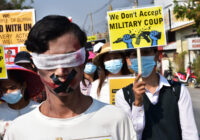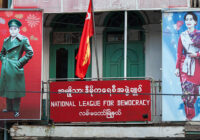The elections might be over, but the political battles have only just begun.
On November 8, Myanmar went to the polls in a relatively hassle-free and clean fashion. Having witnessed events on the ground in Yangon, I applaud and congratulate the people of the country on what is shaping up to be a landslide victory for the National League for Democracy (NLD). It is truly a historic achievement.
NLD supporters, however, must have their expectations managed. Ambition for immediate change must be balanced with a level of political pragmatism to ensure the transition period runs as smoothly as possible. The voting marks only the start of a protracted and fraught political process and, as such, it must be said that the jubilation and celebration immediately following this event is somewhat premature.
This expectation does not seem to be as organic as media reports would have one believe, and it has been managed by the NLD leadership in an inappropriate way. The power of the crowd has been utilized to full-effect. With the tinder set on November 8 as more and more people crowded streets close to the NLD headquarters, the incumbent government cannot afford to ignite the fire of popular uprising.
Memory is an important political tool and has been consistently used by the NLD since its inception to generate support for its campaign. The memory of the party’s history must be refocused when one harks back to the NLD’s doomed victory in 1990.
Admittedly, the political situation at the time was markedly different, but the country held elections with the military junta, which promised to recognize the results—much like what President Thein Sein’s government and its military support have done this year.
The memory of what happened next in 1990 has not diminished and, to some extent, it is under these memories that the NLD have derived their mandate.
The people of Myanmar must not fall into the trap of expecting much more than Aung San Suu Kyi or the NLD can deliver, and everyone who voted for them must reconsider the timeframe in which change can realistically occur.
International media coverage of the election does little to help the common sense approach that must be adopted. The people I have spoken to and the articles I have read talk of change, won freedoms and prevailing democracy.
It must be remembered that not all the votes will be counted until November 15. There must be negotiation and political wrangling to ensure a smooth transition in which current leaders do not lose out or lose face.
We don’t know yet whether a coalition will need to be formed or not. The current parliament still has the opportunity to sit with ministers able to represent their own interests with one foot out of the door. There must be a round of presidential nominations in which preferred candidates are presented to parliament. Any change or victories cannot be reported until the new government, in whichever guise it takes, has taken power and sat uncontested.
This will not take place until well into the new year. The lady herself has done little to emphasize the necessary pragmatism. What kind of leader dares to taunt, and threaten, an incumbent ruler with so much to lose—and only days before the election?
The shift from activist to politician has been a difficult one, and a swift transition might prove to be as flawed as the country’s entire political system. Suu Kyi’s calls on November 11 to meet with the standing establishment to start the process of national reconciliation are certainly a step in the right direction.
The warning-shots from history must not be ignored, and all stakeholders must tread carefully to ensure that the process started with relatively free voting on November 8 continues.
Be under no illusion—there has been no victory yet.
The views expressed in this article are the author’s own and do not necessarily reflect Fair Observer’s editorial policy.
Photo Credit: Szefei/ Shutterstock.com
 We bring you perspectives from around the world. Help us to inform and educate. Your donation is tax-deductible. Join over 400 people to become a donor or you could choose to be a sponsor.
We bring you perspectives from around the world. Help us to inform and educate. Your donation is tax-deductible. Join over 400 people to become a donor or you could choose to be a sponsor.
Support Fair Observer
We rely on your support for our independence, diversity and quality.
For more than 10 years, Fair Observer has been free, fair and independent. No billionaire owns us, no advertisers control us. We are a reader-supported nonprofit. Unlike many other publications, we keep our content free for readers regardless of where they live or whether they can afford to pay. We have no paywalls and no ads.
In the post-truth era of fake news, echo chambers and filter bubbles, we publish a plurality of perspectives from around the world. Anyone can publish with us, but everyone goes through a rigorous editorial process. So, you get fact-checked, well-reasoned content instead of noise.
We publish 2,500+ voices from 90+ countries. We also conduct education and training programs
on subjects ranging from digital media and journalism to writing and critical thinking. This
doesn’t come cheap. Servers, editors, trainers and web developers cost
money.
Please consider supporting us on a regular basis as a recurring donor or a
sustaining member.
Will you support FO’s journalism?
We rely on your support for our independence, diversity and quality.






